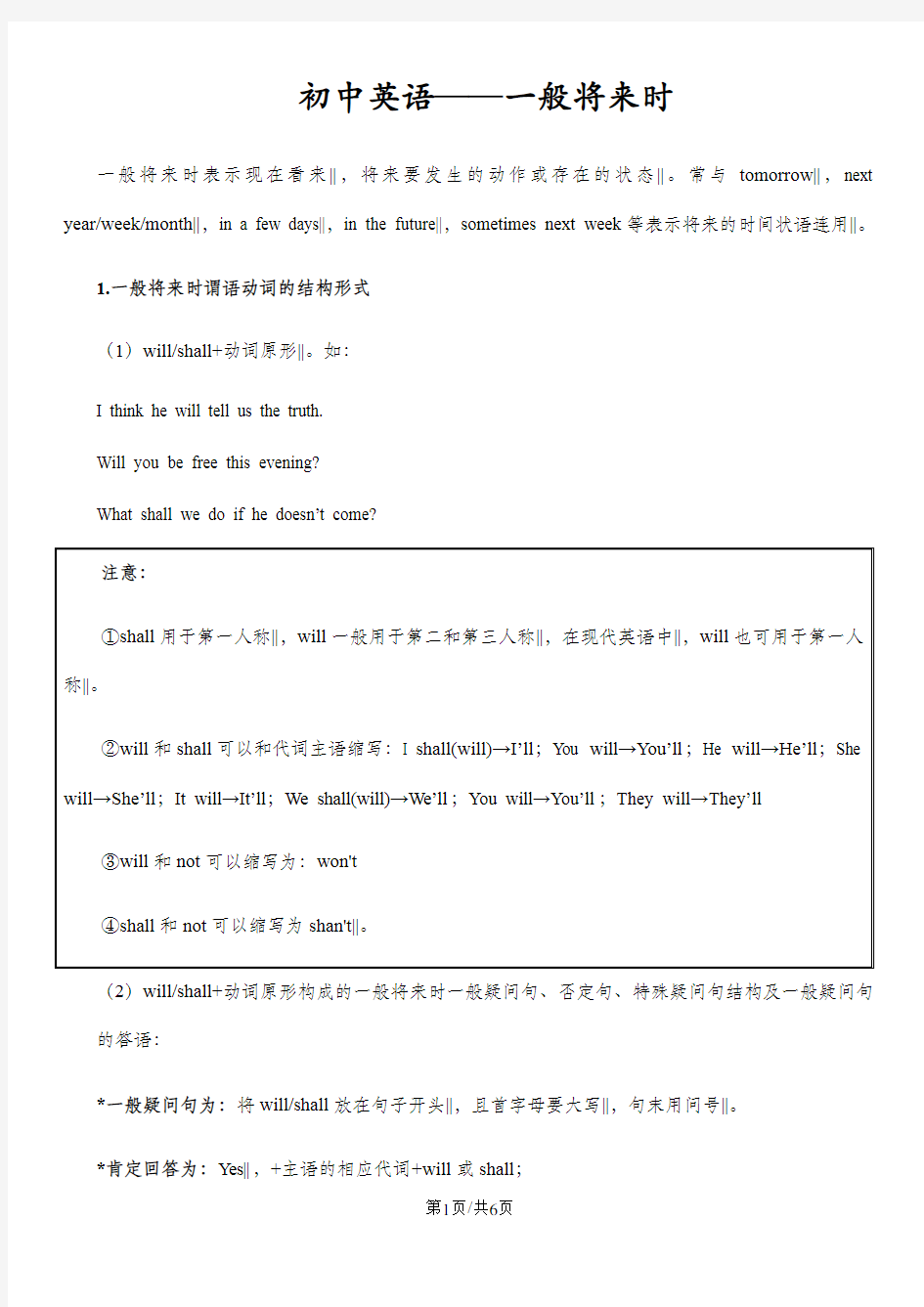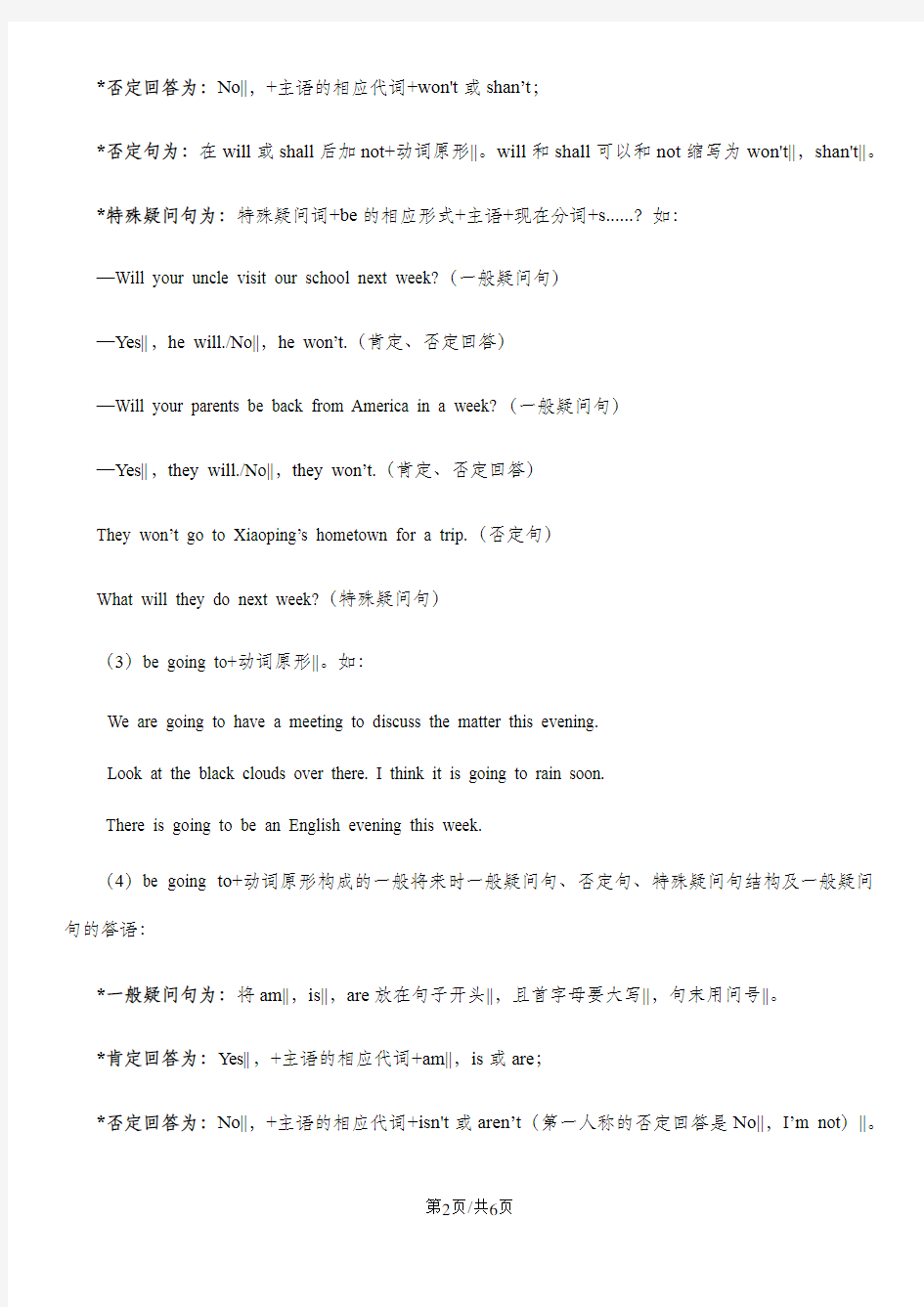

初中英语——一般将来时
一般将来时表示现在看来||,将来要发生的动作或存在的状态||。常与tomorrow||,next year/week/month||,in a few days||,in the future||,sometimes next week等表示将来的时间状语连用||。
1.一般将来时谓语动词的结构形式
(1)will/shall+动词原形||。如:
I think he will tell us the truth.
Will you be free this evening?
What shall we do if he doesn’t come?
(2)will/shall+动词原形构成的一般将来时一般疑问句、否定句、特殊疑问句结构及一般疑问句的答语:
*一般疑问句为:将will/shall放在句子开头||,且首字母要大写||,句末用问号||。
*肯定回答为:Yes||,+主语的相应代词+will或shall;
*否定回答为:No||,+主语的相应代词+won't或shan’t;
*否定句为:在will或shall后加not+动词原形||。will和shall可以和not缩写为won't||,shan't||。
*特殊疑问句为:特殊疑问词+be的相应形式+主语+现在分词+s......?如:
—Will your uncle visit our school next week?(一般疑问句)
—Yes||,he will./No||,he won’t.(肯定、否定回答)
—Will your parents be back from America in a week?(一般疑问句)
—Yes||,they will./No||,they won’t.(肯定、否定回答)
They won’t go to Xiaoping’s hometown for a trip.(否定句)
What will they do next week?(特殊疑问句)
(3)be going to+动词原形||。如:
We are going to have a meeting to discuss the matter this evening.
Look at the black clouds over there. I think it is going to rain soon.
There is going to be an English evening this week.
(4)be going to+动词原形构成的一般将来时一般疑问句、否定句、特殊疑问句结构及一般疑问句的答语:
*一般疑问句为:将am||,is||,are放在句子开头||,且首字母要大写||,句末用问号||。
*肯定回答为:Yes||,+主语的相应代词+am||,is或are;
*否定回答为:No||,+主语的相应代词+isn't或aren’t(第一人称的否定回答是No||,I’m not)||。
*否定句为:在am||,is||,are后加not+going to+动词原形||。is和are可以和not缩写为isn't||,aren't||。
*特殊疑问句为:特殊疑问词+be的相应形式+主语+going to+动词原形+......?如:
—Are you going to have a picnic in the park?(一般疑问句)
—Yes||,we are./No||,we aren’t.(肯定、否定回答)
—Is your teacher going to play basketball this afternoon ?(一般疑问句)
—Yes||,he is./No||,he isn’t.(肯定、否定回答)
We aren’t going to see the movie tomorrow.(否定句)
What are they going to do this evening?(特殊疑问句)
2.一般将来时的用法
(1)will/shall+动词原词||,表示将要发生的动作或存在的状态||。特别是表示客观性的事情或在某条件下要发生的事情||,只能用此结构||。如:
I will finish all the housework very soon.
They will move to Shanghai next month.
We will go for a picnic if it doesn’t rain this Sunday.
(2)be going to+动词原形||。表示即将、将要、打算做已经计划或安排好了的事情||,也可表示有迹象表明肯定要发生的事情||。如:
He is going to visit his grandparents on Saturday.
Lin Tao and I are going to the zoo tomorrow.
What are you going to do this weekend?
(1)come||,go||,leave||,arrive||,begin||,start||,stop||,close||,open||,die||,join||,borrow||,buy等短暂动作的动词||,它们的“be+现在分词”形式表示计划或安排好的动作或即将发生的动作或存在的状态||。如:
Go ahead ||,and I’m coming.
The dog is dying.
Hurry up. The shop is closing.
We are leaving for Shanghai tomorrow.
(2)在条件状语从句和时间状语从句中||,用一般现在时代替将要发生的动作||。如:
He will not come if it rains tomorrow.
We will start our meeting as soon as our teacher comes.
(3)在“祈使句+and/or+陈述句”结构中||,其中的陈述句要用一般将来时||。如:
Work hard||,and you will pass the exam.
Hurry up||,or you’ll miss the early bus.
(6)其他表示将要发生的动作句型:
①be to+动词原形||。表示一种职责、义务、意图、约定、可能性等常规性的活动或注定要做的事情||。如:
Who is to clean the classroom today?
When are you to return your library book?
The bridge is to be completed by the end of this year.
②be about to+动词原形||。表示即将就要做或正好要做的事情||。往往暗含一种时间上的巧合||,因此||,句子不能再用时间状语||。如:
Don’t leave. Li Lei is about to come.
Be quiet. The concert is about to start.
The plane is about to take off.
The meeting is about to start now.
3.“will/shall+动词原形与be going to+动词原形”的用法区别
Will/shall+动词原形与be going to+动词原形||,两者均可表示将来的时间和意图||,有时可换用||,有时不可换用||。不可换用的情况主要是:
(1)若强调某个意图是事先考虑好的||,用be going to;若表示某个意图没有经过事先考虑||,而是在说话的当时才临时想到的||,则用will||。试比较:
“Mary is in hospital.”“Oh||,really? I didn’t know. I’ll go and visit her.”(临时想法||,不能用be going to)
“Mary is in hospital.”“Yes||,I know. I’m going to visit her tomorrow.”(事先考虑的意图||,不能用will)
(2)如果某种迹象表明要发生某事||,用be going to而不用will||。如:
Look at those black clouds. It’s going to rain.
(3)在含有条件或时间状语从句的复合句中||,主句一般用will/shall+动词原形||,而不用be going to+动词原形||。如:
If it rains tomorrow||,we’ll stay at home.
(4)表示不受人的主观意愿影响的单纯的将来||,一般只用will+动词原形||。如:
Tomorrow will be Teachers’ Day.
(5)在正式的通知中多用will+动词原形||。如:
There will be a strong wind to the north of the Huai River.